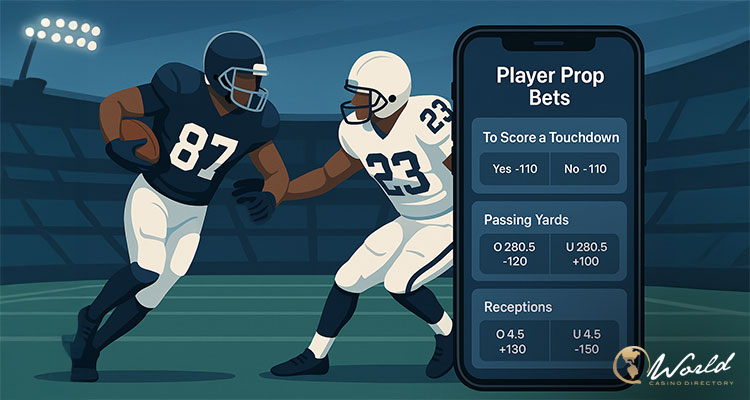Kalshi, the federally registered prediction market, has taken another step toward mirroring the betting menus of traditional sportsbooks. In a recent filing with the Commodity Futures Trading Commission (CFTC), the company self-certified a new category of markets called “FOOTBALLPLAYERSTAT.” This designation allows Kalshi to introduce an extensive array of player performance props, covering everything from passing touchdowns and rushing yards to tackles and punts.
The filing outlines a template question format: “Will <player> have <above/below/between/exactly/at least> <count> <statistic> in <time period> of <game>?” Using this structure, Kalshi can list contracts on dozens of common NFL statistics, according to InGame. Options include completions, attempts, yards, and touchdowns for quarterbacks; rushing and receiving yards and touchdowns for skill players; and defensive categories such as sacks, tackles, and interceptions. Bettors will also be able to speculate on special teams actions, like field goals, extra points, punts, and punt yardage.
Notably, the new certification expands on Kalshi’s earlier touchdown markets by adding passing touchdowns and touchdown type distinctions (rushing vs. receiving). Even niche categories like passes defensed and punting totals are on the menu. The markets can be structured around entire games, halves, or quarters, providing flexibility similar to sportsbook offerings.
Although the filing suggests the contracts could apply to both college and professional football, a spokesperson said in August that Kalshi had “no immediate plans” to list college props.
Settlement Rules and Bettor Frustrations
Kalshi’s contracts come with strict rules that have already sparked controversy. The company specifies that “a player must take at least one snap (offensive, defensive, or special teams). If a player is active but does not participate in any plays, all Contracts settle to the last fair market price before the start of play.”
That rule drew criticism during Week 1 of the NFL season when Bears running back Roschon Johnson was scratched late. Kalshi kept his touchdown market live even after his absence was announced. Traders rushed to bet against him scoring, but the contracts settled at the pre-announcement fair market value of 19 cents. Those who sold at 18 cents or less lost money despite the outcome being impossible.
This settlement policy has raised questions about fairness, with some market participants frustrated that certainty does not necessarily equate to profit.
Election and Football Parlays
Alongside its football props, Kalshi is venturing further into multi-leg markets. The exchange self-certified a “MULTIELECTION” contract last week, allowing users to bet on a parlay of multiple political races. According to the filing, “Every single pairing must be satisfied for the Contract to resolve to Yes.”
Kalshi has experimented with parlays before, including one tied to the NFL season opener earlier this month. However, despite the new certifications, the company has been slow to post additional parlay markets, and as of Tuesday, no NFL Week 3 options were available.
State Challenges and Federal Preemption Arguments
Even as it expands its offerings, Kalshi is locked in a growing legal dispute with state regulators. Earlier this month, Massachusetts Attorney General Andrea Joy Campbell filed a lawsuit in Suffolk Superior Court, alleging the exchange is effectively running an unlicensed sportsbook and violating state gambling regulations. The complaint asks the court to block Kalshi from offering sports wagers without a license.
In response, Kalshi quickly moved to shift the case to federal court, arguing that the Commodity Exchange Act grants the CFTC “exclusive jurisdiction” over all trading on federally designated contract markets. Its filing insists that disputes over its operations must be heard in federal court, not state venues, citing the doctrine of “complete preemption.”
Kalshi has faced similar pushback in other states. Regulators in Nevada, Maryland, and New Jersey have sought to curb its operations, with mixed results. Federal judges granted injunctions in Nevada and New Jersey, siding with Kalshi’s position that federal law overrides state gambling restrictions. Maryland, however, denied the injunction, though enforcement there is paused while the appeal is pending.
Massachusetts marks the first time a state attorney general has brought a case directly in state court, diverging from the earlier pattern of cease-and-desist orders. Kalshi’s legal strategy hinges on convincing federal judges that its contracts are commodities under federal oversight—not state-regulated wagers.
Growing Market Despite Uncertainty
Kalshi entered the sports space with basic Super Bowl markets last year but has expanded aggressively since then. This season it is offering spreads, totals, and moneylines for every NFL matchup, alongside player touchdown props. The company says trading activity has exceeded $2 billion so far in 2025, though prop bets remain a smaller portion compared to moneyline contracts.
As sportsbooks, prediction platforms, and regulators clash over definitions and jurisdiction, Kalshi’s self-certified markets may determine the future boundaries between gambling and federally regulated trading. With football season underway and election season approaching, the stakes are only getting higher.



